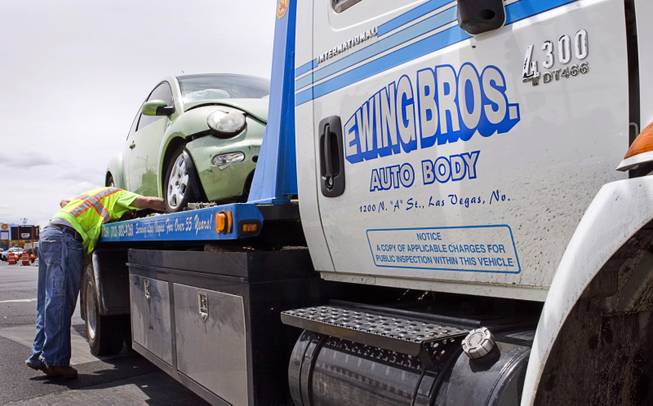
A Ewing Bros. tow operator secures a car on his truck after an accident at Boulder Highway and Tropicana Avenue, May 17, 2011.
Tuesday, May 1, 2012 | 5:09 p.m.

Steve Sisolak
Clark County commissioners tried on a tow-truck/storage lot fight that state lawmakers wrestled with a year ago and found it every bit as difficult to unravel — and full of the same emotional arguments on one side for status quo and on the other for change.
When almost four hours of debate ended today, county commissioners stuck with the the current system, failing to amend the county code that would have, in essence, given insurance companies the option to determine where they want insured vehicles involved in accidents or other police actions to be towed.
All sorts of arguments were brought up against Commissioner Steve Sisolak’s attempt to change the code, which he said came about because of the gouging many residents experience at the hands of tow truck/storage lot companies.
Those arguments include: It’s a state issue; change doesn’t really help consumers; and police don’t need the aggravation.
But as with most issues that come before political bodies, it mostly boiled down to money.
When vehicles are ordered towed and stored by police for a variety of reasons, vehicle owners are allowed to have it towed wherever they want. Many, however, forget, are injured or have no idea where to tow a car, so they leave it up to a police officer.
Currently, Metro has vehicles towed to one of three storage yards that are in a rotation. Those are Ewing Brothers, Quality Towing and Fast Towing.
Each charges $30 per day but can also add other fees: lien fees, lot-visit fees, light-duty fees, extra-man fees, yard clean-up fees and auction-preparation fees. Tow companies say that’s where they make the bulk of their money.
But those fees are also the focus of many vehicle owners' ire, Sisolak said. In some cases, the fees grow so high they add up to more than the vehicle is worth. So Sisolak introduced an ordinance that gives insurance companies the option to determine where they want vehicles towed. He believes that would lead to competition by storage yards to lower fees to get more business from insurance companies.
Sisolak said he became involved after a complaint from a local grandfather who had given his grandson an old pickup truck. Soon after, the grandson parked illegally and the truck was towed. But the grandson didn’t have the title yet, so the pickup sat for a week in a storage yard until the grandfather, who was away, could bring the title. By that time, storage fees had risen to between $1,200 and $1,400. The kid and grandfather couldn’t afford the fees so the truck was auctioned for $800.
To make matters worse, the tow/storage company then sued the grandfather for the difference.
“Appalling,” is how Sisolak described it.
His arguments fell to an audience that was sometimes less than understanding in a packed County Commission chamber. Drivers for three tow truck companies erupted in loud applause when one of the first speakers decried the new ordinance as something that he said would “put us out of work.” They stopped the applause after Commission Chairwoman Susan Brager admonished them to keep quiet so the meeting, already two hours long, could move along.
Many drivers said they’d lose their livelihood — Metro tows about 2,000 vehicles per month, with storage lasting an average seven to 10 days.
Many speakers appeared to be associated with the tow/storage companies.
Attorney Don Campbell said the new ordinance would make towing a more dangerous job because trucks might have to travel farther. Sisolak responded that would depend upon where a new storage yard is located.
Campbell also said the county wasn’t the correct area to address the issue. Towing is regulated by the Nevada Transportation Authority.
Another tow truck company employee said new storage lots would be reaping benefits on the backs of existing tow companies. Others said tow companies would lose money because most of their money is made through storage, not towing.
A Metro spokesman argued that its rotating system works because it prevents the officer from becoming the middleman and having to figure out whose insurance is current and where a vehicle needs to be towed by order of the insurance company.
Many others, though, said the three existing companies form, if not a monopoly then a “tri-opoly.” Opening storage up to more companies, and letting insurance companies bargain with storage lots would lead to lower fees.
One man said 15 months ago he was only able to get his vehicle, which had been stolen and recovered then towed to a storage lot, by paying the fees in cash. (Sisolak said the cash-only transactions had been eliminated recently by Metro, so now storage yards on Metro’s rotation must take credit cards.)
“The abusive practices of some business as it relates to towing and storage is of concern to me because it’s a concern to thousands of men and women, some of whom are in this audience,” Sisolak said to a lawyer arguing against the change.
“If not a monopoly, it’s as close as you can get to a monopoly,” he added.
But Commissioner Chris Giunchigliani said the changes seemed designed to create a monopoly by another storage lot. Snap Towing has publicized its intent to provide storage with no additional fees and a daily fee of about $20.
Giunchigliani also agreed with Campbell that the state, not the county, was responsible for regulating storage lots. Mary-Anne Miller, county counsel, countered that she didn’t believe the state’s failure to adopt storage lot language in 2011 prevented county commissioners from doing so.
Still, Giunchigliani felt the government was needed to regulate fees.
“Nothing in this helps (consumers),” she said, adding that the county should lobby in favor of a proposed bill to address onerous fees that may be introduced in the 2013 legislative session.
“The free-market system would take over,” Sisolak said.
Commissioner Lawrence Weekly sided with Sisolak and put it plainly: “I’m all for competition. I think competition is great.”
Commissioner Larry Brown said he didn’t like the idea of creating more work for police officers.
After more than four hours, commissioners voted 4-3 against the change. Sisolak, Tom Collins and Mary Beth Scow voted yes; Giunchigliani, Brown, Weekly and Susan Brager voted no.

Join the Discussion:
Check this out for a full explanation of our conversion to the LiveFyre commenting system and instructions on how to sign up for an account.
Full comments policy